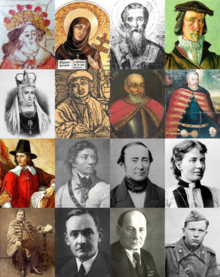Belarusians
Appearance

Belarusians (Belarusian: беларусы, bielarusy) are an East Slavic ethnic group who are native to modern-day Belarus and the immediate region.
| This theme article is a stub. You can help out with Wikiquote by expanding it! |
Quotes
[edit]- In many respects, Belarusians have made more progress in escaping from Soviet mindsets than any other people in the region except for the Estonians, Latvians and Lithuanians.
- Paul A. Goble, "More than Most Post-Soviet Nations, Belarusians Beginning to Overcome Soviet Mentality, Dryndov Says", Window on Eurasia (June 28, 2021)
- The sheer scale of America in the 1920s was impressive, and its variety was downright astonishing. The nation’s population had nearly doubled since 1890, when it had numbered just sixty-three million souls. At least a third of the increase was due to a huge surge of immigrants. Most of them had journeyed to America from the religiously and culturally exotic regions of southern and eastern Europe. Through the great hall in the immigrant receiving center on New York’s Ellis Island, opened in 1892, streamed in the next three decades almost four million Italian Catholics; half a million Orthodox Greeks; half a million Catholic Hungarians; nearly a million and a half Catholic Poles; more than two million Jews, largely from Russian-controlled Poland, Ukraine, and Lithuania; half a million Slovaks, mostly Catholic; millions of other eastern Slavs from Byelorussia, Ruthenia, and Russia, mostly Orthodox; more millions of southern Slavs, a mix of Catholic, Orthodox, Muslim, and Jew, from Rumania, Croatia, Serbia, Bulgaria, and Montenegro. The waves of arrivals after the turn of the century were so enormous that of the 123 million Americans recorded in the census of 1930, one in ten was foreign born, and an additional 20 percent had at least one parent born abroad.
- David M. Kennedy, Freedom from Fear: The American People in Depression and War 1929-1945 (1999), ISBN 0-19-503834-7, p. 13-14
- The Belarusian failure therefore provides a useful test. Here we have an “ethnic group” which is the largest by far in the area in question. According to the Russian imperial census of 1897, more people spoke Belarusian in Vil’na province than all other languages combined. In Vil’na, Minsk, Grodno, Mogilev, and Vitebsk provinces, contiguous territories of historic Lithuania, speakers of Belarusian were three quarters of the population. In the twentieth century, this “ethnic group” did not become a modern nation. In combination with Lithuanian and Polish successes, this Belarusian failure helps us to perceive what national movements actually need.
- Timothy Snyder, The Reconstruction of Nations: Poland, Ukraine, Lithuania, Belarus, 1569-1999 (Yale University Press, 2003)
- The signing of the Union Treaty is not just sad. This is the crime of the century. This, of course, is the genocide of the Belarusian nation. This is the end of Belarusian history.
- Vasil Bykau, “Ён Прыехаў, Сам Памёр, Усё Спакойна…” Апошнія Тыдні Васіля Быкава // svaboda.org
(in Belarusian)
- Vasil Bykau, “Ён Прыехаў, Сам Памёр, Усё Спакойна…” Апошнія Тыдні Васіля Быкава // svaboda.org
External links
[edit] Encyclopedic article on Belarusians on Wikipedia
Encyclopedic article on Belarusians on Wikipedia Media related to Belarusians on Wikimedia Commons
Media related to Belarusians on Wikimedia Commons
